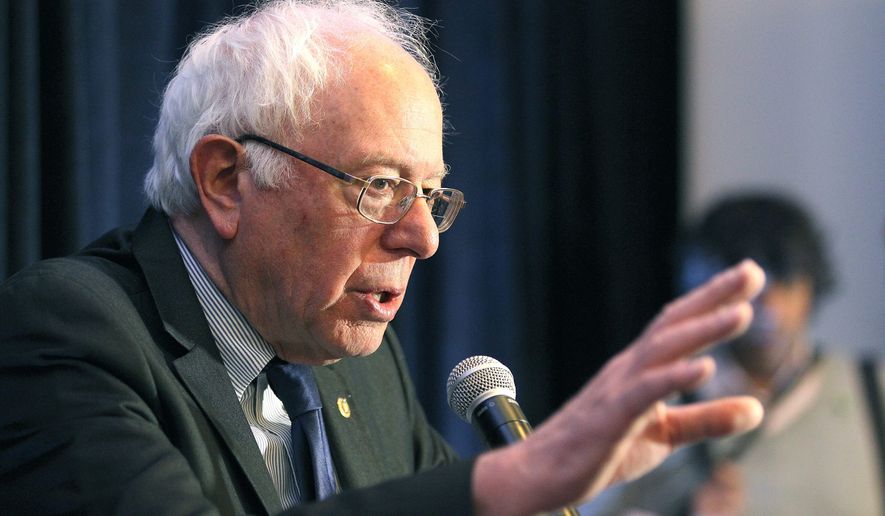Sen. Bernard Sanders is poised for a good Saturday, looking at a possible sweep of all three caucuses — but even those wins, in relatively small states, will do little to cut into Hillary Clinton’s overwhelming delegate lead.
Instead, some analysts say his continued campaign — which some Democrats have begged him to end — is driving a deeper wedge within the party, driving progressives away from Mrs. Clinton, highlighting her weaknesses as a candidate and endangering her prospects for November.
“Sanders could do long-term harm to Clinton, especially if he keeps winning caucus states. Those victories show continuing unease with Clinton among Democratic activists,” said Darrell M. West, director of governance studies at the Brookings Institution. “If she does poorly with progressive voters, it would signal some weakness for the fall election. She needs to unify the party around her so she can make the strongest case possible for her presidential bid. The sooner she can close down the Sanders bid, the better off she will be in the general election.”
But there’s little sign Mr. Sanders will exit the race anytime soon. He’s already vowed to stick around until the convention, and recent polling shows that, despite his massive delegate deficit, he’s on Mrs. Clinton’s heels.
A national Bloomberg survey released Thursday, for example, showed Mr. Sanders actually leading Mrs. Clinton, 49 percent to 48 percent.
While polling in the Saturday caucus states of Washington, Alaska and Hawaii has been sparse, there’s a real chance Mr. Sanders could run the table in those three contests and feed the narrative that the momentum is on his side.
Moving forward, there is evidence a portion of Sanders supporters may not back Mrs. Clinton in a general election.
NBC News exit polling conducted on March 15 — when Ohio, Illinois, Missouri, Florida and North Carolina voters went to the polls — found that 51 percent of Sanders supporters said they would be dissatisfied with Mrs. Clinton as the nominee.
Still, some Clinton backers and party insiders say they don’t buy into the idea Sanders backers won’t show up for the party’s candidate.
“The fact of the matter is, between the Supreme Court [nominations] and Donald Trump, progressives would need to get their heads examined if they didn’t turn out for Hillary Clinton in record numbers. This one is for all the marbles,” said Clinton supporter Jim Manley, director of the communications practice at QGA Public Affairs and former spokesman for Senate Minority Leader Harry Reid.
In fairness, the same NBC News exit polling also found that 46 percent of Clinton supporters said they’d be dissatisfied with Mr. Sanders as the nominee, and Mr. Manley contends that nearly all of those voters are likely to back whichever Democrat is on the ballot in November, especially if he or she goes up against a divisive Republican such as Mr. Trump.
If the primary fight drags on, Clinton supporters concede that they don’t want to see Mr. Sanders continue bashing the former first lady over her Wall Street ties, her paid speeches to Goldman Sachs, her support for controversial trade bills and other stances that have raised eyebrows in liberal circles.
“My hope is that he’ll keep it relatively civil and not go too far in the attacks,” Mr. Manley added.
Mr. Sanders’ attacks, along with swirling questions about Mrs. Clinton’s role in the lead-up to and aftermath of the 2012 Benghazi attack and her use of a private email server while secretary of state, have fueled questions about Mrs. Clinton’s honesty and trustworthiness. Polls consistently have shown Democrats see Mr. Sanders as the more honest candidate.
While Mr. Sanders has avoided Benghazi and the email scandal, his jabs at Mrs. Clinton clearly have resonated with a sizable part of the party and perpetuate the narrative that he’s a candidate of the people, while the former secretary is a creature of the political establishment.
Mr. Sanders, for example, has crushed Mrs. Clinton among young voters, those who identify as progressives and those who believe the next president must move the country in a more liberal direction.
The Vermont senator often boasts about the fact that those blocs of voters form the backbone of his support and are the main reason why he’s been able to make the Democratic primary contest as competitive as it has been.
“The impressive numbers of young people and working-class people who participated in the process are exactly what the political revolution is all about,” he said in a statement after winning the Idaho and Utah contests on Tuesday.
Still, Mrs. Clinton remains far ahead in the delegate race, and she pulled even further ahead Tuesday by winning in Arizona.
The latest Associated Press tally gives Mrs. Clinton 1,690 delegates to 946 for Mr. Sanders. The figures include delegates awarded from primaries and caucuses and so-called superdelegates.
It takes 2,383 delegates to secure the Democratic nomination.
• Ben Wolfgang can be reached at bwolfgang@washingtontimes.com.




Please read our comment policy before commenting.